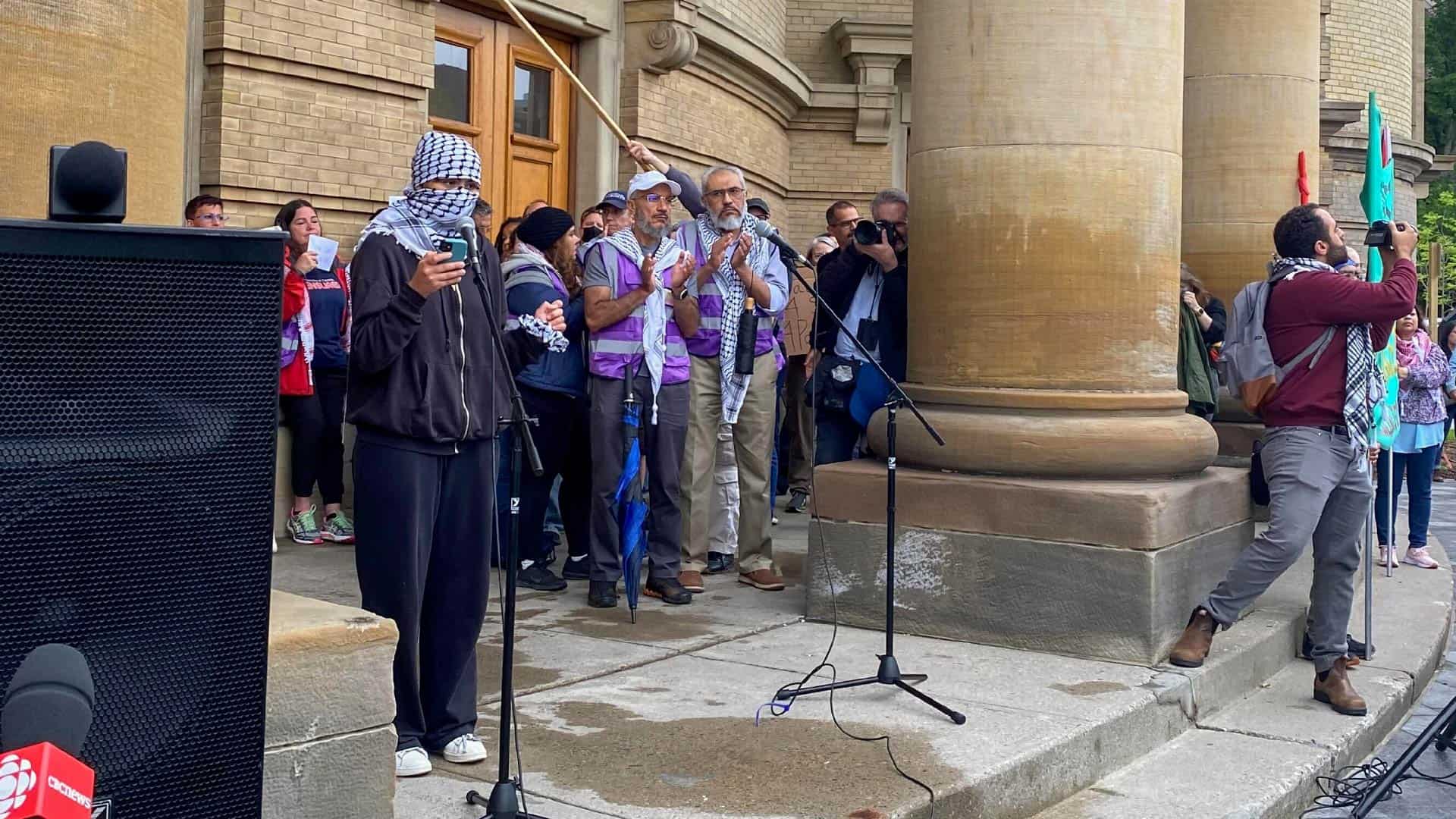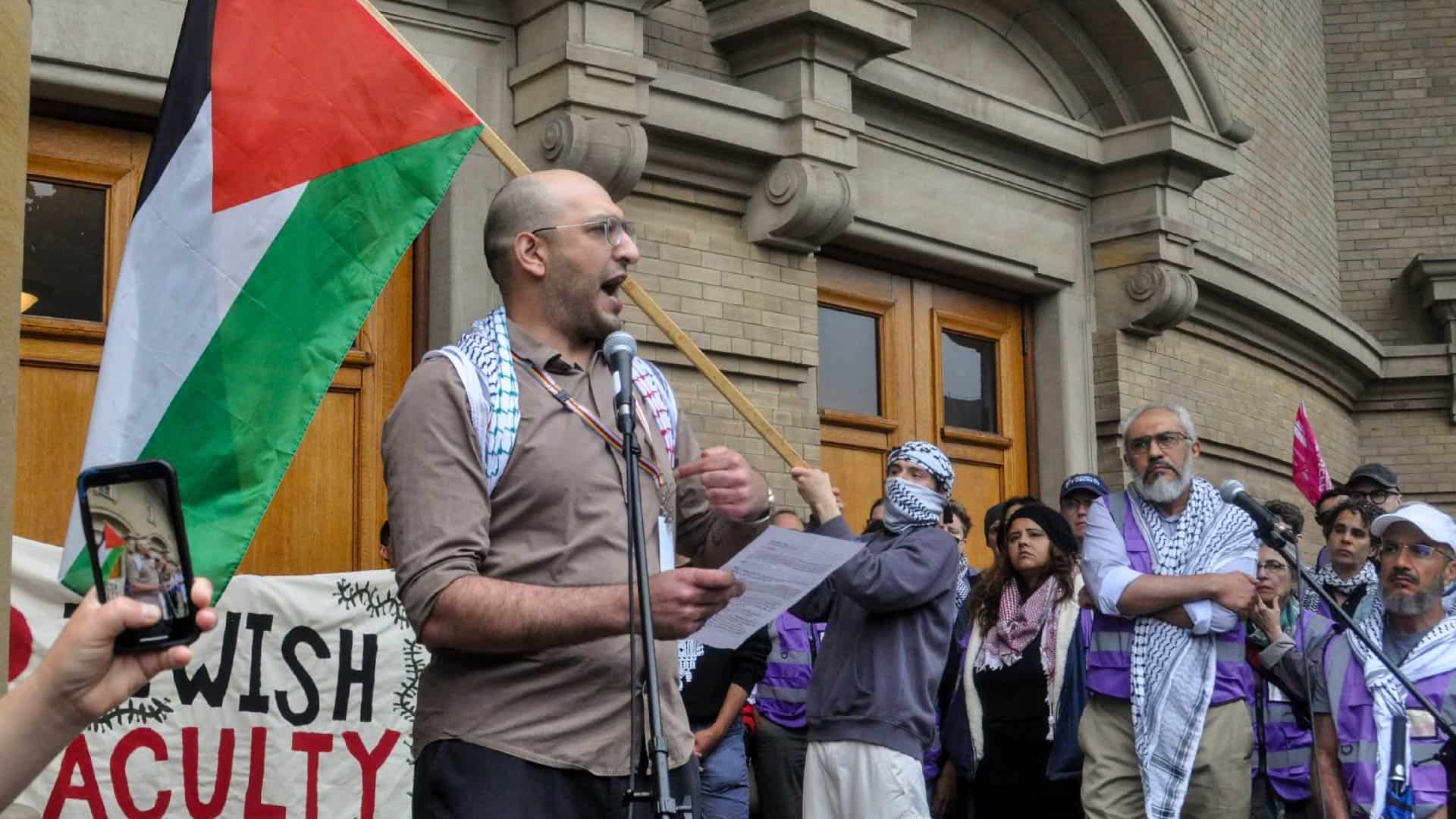On May 27, U of T President Meric Gertler notified the university community that the administration is seeking an injunction and an expedited court case from the Ontario Superior Court of Justice to bring an end to the ongoing student encampment.
Three days prior, U of T issued a trespass notice to student protesters in the camp, giving them until May 27 at 8:00 am to clear the field. In response to the notice, student group UofT Occupy for Palestine (O4P) — the encampment’s organizer — held a rally to show the administration that they do not plan on leaving King’s College Circle.
As the encampment enters day 26, students continue to call on the university to disclose their financial holdings, divest from companies supplying the Israeli military, and cut ties with Israeli academic institutions.
Injunction request
At 8:15 am, Gertler released a statement addressed to the university community. Approximately 40 minutes later, the statement was sent to the student body in an email.
He noted that lawyers representing the university are seeking an injunction — which is a court order typically used to protect property rights — from the Ontario Superior Court of Justice and asked for an expedited case conference to schedule the hearing.
Other Canadian schools, such as McGill University and Université du Quebec à Montréal (UQAM), have also sought injunctions to remove student encampments at their universities. The Quebec Superior Court has since denied multiple injunction requests from McGill’s administration and granted a partial injunction at UQAM. Student protesters at both schools continue to occupy parts of their campuses.
CBC News and the Toronto Star have obtained the notice of motion that U of T submitted to the court. In the notice, the university expressed a number of concerns over the encampment.
“Members of the university community and the public have expressed serious concerns to the university about their health, safety, security, wellbeing, and freedom of speech and expression as a result of the encampment,” the notice read. “The university has and will continue to suffer irreparable harm if the occupation and encampment are permitted to continue.”
Ongoing negotiations
On May 26 at 11:30 am, O4P representatives held a press conference in front of Simcoe Hall.
O4P spokesperson Mohammad Yassin, a fourth-year student studying economics, presented the counter offer that O4P student representatives gave to the administration during their meeting on the same day. He described the university’s offer as “more of a restatement of university policy than it is an actual offer.”
In its counter offer, O4P maintains that the university divest its endowments, capital assets, and other financial holdings that support Israel, and disclose all publicly-traded investments held in endowments, short-term working capital assets, and other financial holdings of the university.
O4P had originally called on the university to cut ties with Israeli academic institutions “physically located on illegal settlements or the ones that directly sustain this genocide.”
In its counter offer, they specified that it wants the university to “suspend” institutional partnerships with the Hebrew University of Jerusalem and the artificial intelligence partnership with Technion — Israel Institute of Technology.
“We are planning to stay here until we get a commitment to our demands,” said Yassin. “The process itself, the pulling of funds from companies that support the Israeli government, may take time, but the time for the university to do so is immediate.”
In a statement to The Varsity, a U of T spokesperson wrote that claims connecting the university to the Israeli military and the investment of weapons manufacturing have “no basis in fact.”
At the press conference, O4P spokesperson Erin Mackey — a fourth-year student studying political science and environmental studies — noted that she understands how U of T’s investments work and still believes the university is playing a part in the conflict.
“It’s the same money. It’s the same tuition dollars that are being spent on funding a genocide,” she said.
At 5:00 pm on May 26, the university met with the student protesters. In Gertler’s statement, he said that the university remains hopeful in reaching an agreement and ending the encampment.
When The Varsity asked the university about what was agreed on during the meeting, it declined to comment.
Trespass deadline
On May 27 at 8:00 am, students held a rally in support of the encampment and to protect them from potential police presence.
Approximately 400 people gathered outside of Simcoe Hall and Convocation Hall demonstrating their solidarity with student protesters. In addition, members of the Ontario Federation of Labour, Canada’s largest labour federation that represents over one million Ontario workers; CUPE 3902, a union representing over 10,000 U of T contract education workers; and the Jewish Faculty Network, a group of Jewish faculty from Canadian colleges and universities, delivered speeches as well.
O4P representative Sara Rasikh, a first-year masters student studying social justice education, led the rally, discussing the university and how far the encampment has come.
“The University has never once said that they want to put an end to the Israeli genocide of the Palestinian people, but only that they want to put an end to the student encampment,” she said.
The rally featured a number of other speakers, including Mariam Khativ, a U of T student from Gaza. She lost her second cousin in an Israeli airstrike.

JAMES BULLANOFF/THE VARSITY
“I will never undergo the strife my family in Gaza is experiencing,” Khativ said. “The very least I can do is set up a tent.”
Mackey also spoke during the rally about her dismay as a U of T student.
“I’m appalled to be a student at this university,” she said. “To know my tuition dollars are used to fund genocide, bombs, weapons, death, destruction, devastation, heartbreak, and grief.”
In between speakers, people chanted “the students and workers united will never be defeated” and “one day longer, one day stronger.”
The rally ended at around 10:15 am.
Parliament Hill meeting
At 11:00 am, Gertler virtually met with the Standing Committee on Justice and Human Rights — which studies the bills, policies, and spending of Canada’s Department of Justice — to discuss “antisemitism and additional measures to address the fears of Canada’s Jewish community.”
Gertler joined the committee alongside the presidents of Concordia University, McGill University, and the University of British Columbia. They all agreed that antisemitism is a significant issue on university campuses.
“Antisemitism has been a growing presence recently in our university,” said Gertler. He mentioned that the university has taken “a comprehensive set of actions” to ensure that Jewish community members feel safe and respected on campus.
He added that the university announced a new lab for the study of global antisemitism in January, as well as a new initiative that aims to promote “civil discourse” in March across all campuses.


